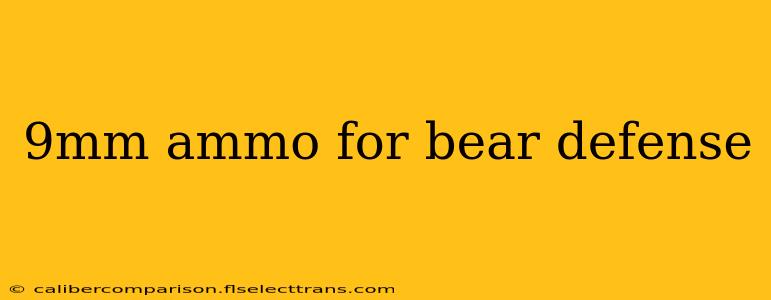The question of whether 9mm ammo is sufficient for bear defense is a complex one, sparking heated debate among hunters, outdoors enthusiasts, and self-defense experts. While it's not the ideal choice, understanding its limitations and potential within a specific context is crucial for responsible decision-making. This article delves into the realities of using 9mm for bear encounters, exploring factors beyond simple bullet caliber.
The Challenges of 9mm Against Bears
Let's address the elephant in the room: 9mm is generally considered inadequate for reliable bear defense. Compared to larger calibers like .44 Magnum, .454 Casull, or even 10mm Auto, 9mm lacks the stopping power needed to reliably incapacitate a charging bear, especially a large grizzly or brown bear. The smaller projectile and lower energy transfer mean a greater chance of insufficient damage to deter or stop the attack. A bear's thick hide and massive musculature require significant force to inflict debilitating injuries.
Factors Beyond Caliber
While caliber is important, several other factors contribute to the effectiveness of bear defense ammunition:
-
Bullet Construction: The type of bullet is critical. A hollow-point designed for expansion in human tissue might not perform as effectively against thick bear hide. Hard-cast bullets, designed for penetration, are often favored, but even these might not offer enough stopping power in a 9mm round.
-
Shot Placement: Even the most powerful caliber will be ineffective if the shot isn't placed accurately. Precise shots to vital areas (heart, lungs, brain) are paramount, and achieving this under the intense pressure of a bear attack is exceptionally challenging. This difficulty is magnified with a less powerful round like 9mm.
-
Multiple Shots: Bear defense often necessitates multiple shots to effectively stop a threat. The capacity of your firearm and your ability to quickly and accurately deliver those shots under stress are essential. A 9mm's effectiveness is heavily reliant on rapid, accurate follow-up shots.
-
Bear Species and Size: The size and species of bear significantly impact the ammunition's effectiveness. A small black bear might be deterred or stopped by a well-placed 9mm shot, but a large grizzly or brown bear demands considerably more firepower.
When Might 9mm Be Considered? (With Caveats!)
It's crucial to understand that considering 9mm for bear defense should only be done under very specific and limited circumstances:
-
Last Resort: If 9mm is the only firearm available, it's better than no defense at all. However, it should be viewed as a last resort, with a realistic understanding of its limitations.
-
Close-Range Encounters: At very close range, the potential for effective shot placement increases, potentially maximizing the 9mm's limited capabilities.
-
Smaller Bear Species: A 9mm might offer a slightly better chance against smaller black bears, but this is still not a guaranteed solution.
Better Alternatives for Bear Defense
Choosing appropriate bear spray and a firearm with significantly greater stopping power are far better choices. Consider calibers like:
- .44 Magnum
- .454 Casull
- 10mm Auto
- 12 Gauge Shotgun (with appropriate slugs)
These offer a considerably higher likelihood of successfully stopping a bear attack.
Conclusion: Prioritize Safety and Preparedness
Using 9mm ammo for bear defense carries significant risks. While it's not entirely useless in extreme circumstances, it shouldn't be relied upon as a primary or preferred method of defense. Prioritize proper bear safety practices, invest in reliable bear spray, and choose a firearm caliber appropriate for the potential threats in your region. Consult with experienced hunters, guides, or wildlife officials to make informed decisions that prioritize your safety. Your life depends on it.

